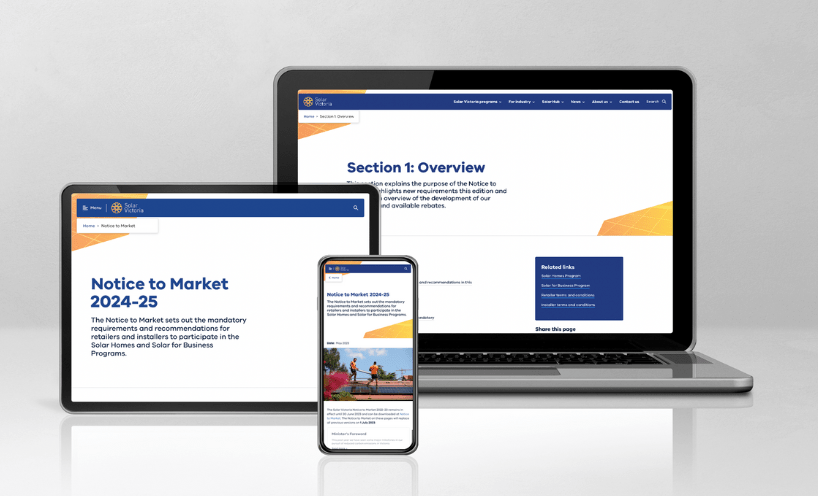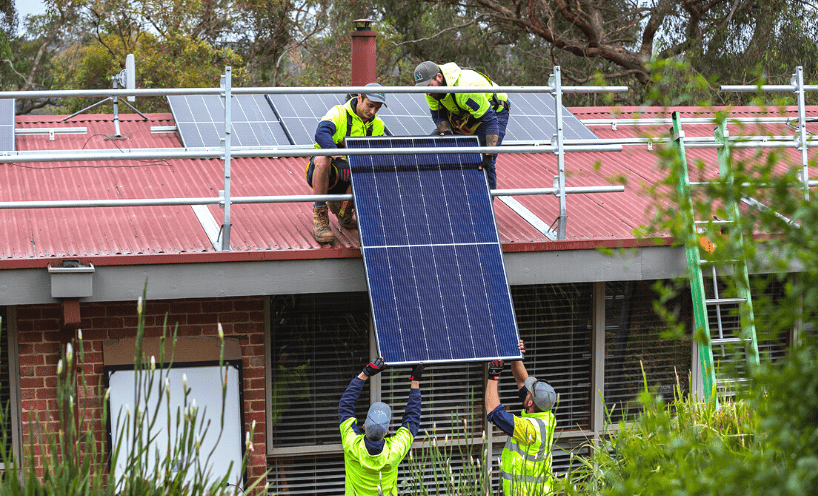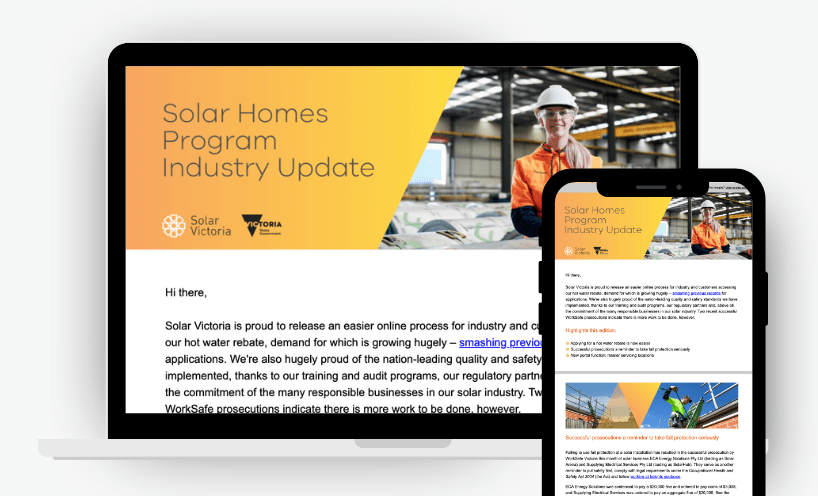Retailer requirements
Authorised retailers must provide clear and unambiguous information, including clear, complete and fair invoicing to customers and a high standard of after-sales service. Retailers are required to provide complete and fair invoicing that is reflective of customer benefit expectations. They must also ensure that the solar system is fit for the needs of each customer.
Solar Victoria takes a rigorous approach to safety, quality and standards under the Solar Homes program. This includes an extensive approach to auditing and data analysis across thousands of invoices and customer interactions.
Retailers accept the Retailer Terms and Conditions and must meet mandatory requirements set out in the Solar Victoria Notice to Market.
Installer requirements
Installers accept the Installer Terms and Conditions and must meet mandatory requirements set out in the Solar Victoria Notice to Market.
Scan customer QR codes before work starts
Installers MUST scan the customer QR code on-site on the day of the customer’s installation BEFORE starting any work. The QR code step helps to:
- keep everyone safe,
- link the installation to you, and
- tell regulators that the install is about to start and can be inspected to ensure safety standards are met.
If you don’t scan the customer’s QR code on-site when you start the installation you are in break of our terms and conditions and could be suspended or removed from the program. Find out more about accessing accreditations and scanning QR codes.
Advertising and sales tactics
As an authorised retailer you must not sell Solar Homes rebates or loans to new or existing customers using door-to-door or cold-call telemarketing sales techniques. This includes sales outsourced to contractors or marketing companies.
You can only make marketing or sales calls:
- at the request of the consumer or with their express permission
- within three months or a timeline specified when the consumer opts into calls
- in accordance with the New Energy Tech Consumer Code
- to notify a previous customer of a product default or recall that affects them.
Retailers are also prohibited from using cold-call telemarketing and (from 1 August 2024) door-to-door sales tactics to sell incentives available through the Victorian Energy Upgrades (VEU) program administered by the Essential Services Commission.
This protects vulnerable people from persistent, unsolicited or nuisance calls and pressure sales tactics. It aligns with prohibitions on retailers from contacting consumers who are listed on the ‘Do Not Call Register’.
Authorised retailers must comply with all laws when publicising incentives under both programs. They cannot make false and misleading representations, including:
- false costing information
- misleading information regarding eligibility for government rebates
- completing applications on behalf of customers
- claiming endorsement or affiliation with government and public figures.
We may request at any time that a retailer stop any publicity if we think they are:
- making representations that are false and misleading; or
- expressing information incorrectly in any publicity regarding the Solar Homes Program or Solar Victoria.
We monitor for and investigate inappropriate or high-pressure marketing and sales tactics and will refer conduct that may breach Australian Consumer Law to Consumer Affairs Victoria.
Consumers also have 10 full business days to reconsider agreements made in any circumstances. This cooling-off period gives them time to ensure they are happy with the decision and that they have all the information needed to make a good choice. It begins on the first business day after the agreement is made. If the consumer cancels the agreement, there’s no penalty.
For more about penalties for breaching Australian Consumer Law, go to the Australian Competition and Consumer Commission website.
Responsible lending practices
Solar Victoria is a responsible lender. We consider each applicant’s financial circumstances (including repayment obligations to other lenders) to assess whether the:
- applicant can meet the financial obligations under the proposed loan without substantial hardship
- proposed loan meets their needs.
If you offer finance, you must also:
- offer customers credit through a credit provider licensed under the National Consumer Credit Protection Act 2009 (National Credit Act) or an unlicensed provider that has been approved by the Clean Energy Council as meeting minimum consumer protections
- ensure any deferred payment plans (including Buy Now Pay Later arrangements) offered to customers to part finance the cost of a solar panel (PV) or solar battery installation meet this NETCC requirement. We recommend you contact the credit provider or the NETCC Administrator to determine if this requirement has been met.
Industry focus on safety and quality
We work with regulators and peak bodies to continuously improve safety and quality within the solar industry in Victoria.
An installation can be inspected for safety compliance during and after work is complete by regulators WorkSafe, Energy Safe and the Victorian Building Authority. Around five per cent of installations are also inspected by independent auditors.
These inspections help keep customers and installers safe, and allow us to see where we can improve. Read more about Audits, safety and quality.
Resources
Updated




